China Dolls Read online
Page 7
“Maybe he’s deciding if you’re wife material,” Helen said.
“Oh, stop!”
Helen’s lips formed a gentle smile, and then she slowly backed away from us as though she were a grain of wheat being sucked into a silo. She didn’t want to leave us, and we didn’t want to let her go, but she never once hinted that she might invite us into the compound to sit on her bed and talk until we all fell asleep. That was something I still missed—and longed for—from when Velma and I were friends.
After the gate swung shut, Ruby and I slowly continued to our apartment. We weren’t in a hurry, because nothing and no one waited for us.
“Marry Monroe?” I mused. “He doesn’t even know me.”
Ruby lifted her shoulders and let them drop. She obviously didn’t want to talk about it. Despite her funny stories, being jobless weighed on her. I worried for her too.
With sudden clarity, I understood that Ruby might be more outgoing and Helen might be from a better family, but I linked the three of us together. I was the Velma of the group! Only nicer.
MY FATHER SCREAMED, “Measly girl! Worthless girl! You aren’t going anywhere!” He bore down on me, trapping me in the corner of our living room. He unbuckled his belt and drew it through his pants loops in a single fast flourish. I had no way to escape … The leather lashed through the air before landing on my skin … The terrible familiar sting …
I jolted awake and lurched into a sitting position. Panting … Sweaty … I hung my head as I pushed at my fear and feeling of helplessness.
After a few moments, my hands still shaking, I wiped my hair off my face so I could see the clock. It was 9:30 in the morning. I’d gotten to bed from rehearsal only five hours earlier. I lay back down, stared at the ceiling, and let tears run from my eyes to my ears. But I had to pull myself together. In forty-five minutes, I would be going on my first date ever.
I pulled on the silk robe I’d purchased at a curio shop on Grant and padded out to the main room. Ruby had already left to go job hunting, but last night we’d talked about what I should wear, and if Monroe would like me better with or without makeup. I made myself a cup of tea, took it back to the bedroom, and began to get ready. I’d need to spend extra time on my face now to hide the splotches and swelling. By the time I went downstairs, I thought I looked pretty.
Monroe picked me up at 10:15 outside my building and we walked to the corner of Stockton and Clay, joining another two hundred or so people. He told me we were going to a “protest.” This was a surprise and hardly the date I’d imagined, but I decided to let the day unfold the way Monroe wanted it to. As soon as we climbed onto the bed of a pickup truck, I knew this was going to be a real adventure. We joined a convoy of cars and stake-back trucks and drove down to Pier 45—singing, yelling, and cheering the whole way—to where a Greek ship, the SS Spyros, was docked. Monroe told me the vessel had been charted by Mitsui Company to transport 8,500 tons of scrap iron to Japan. We were there to picket against the shipment. Monroe’s decision to bring me here showed him perfectly. He was an ABC—an American-born Chinese, like me. His American birthright gave him the freedom to state his views publicly. He was, as Helen put it, one of those new brooms who wanted to sweep the world clean of all inequities.
“Girls like you need to join the embargo against Japan by no longer wearing silk stockings.” Monroe’s hair blew in the wind and his eyes shone with fervor. “But everyone can help by keeping scrap metal out of the Japs’ mitts so they can’t turn it into bombs and bullets to use against China.”
Monroe and I grabbed signs, then he boldly took my hand and squeezed it. Together we joined the picket line before the pier. “Victory! Victory! Victory!” Word traveled. More people streamed down the hill from Chinatown to the Embarcadero. Mothers sent drinks, sandwiches, oranges, Chinese buns, and dumplings. One family delivered an entire roast pig! Soon people carried their placards in one hand and roast pork in the other. It was the largest demonstration of Chinese the United States had ever seen. I’d never experienced anything like it, and I guess no one else had either. Monroe had given me this once-in-a-lifetime event. I was glad he’d brought me.
At the climax, the gathering was five thousand people strong. Lieutenant Governor-elect Ellis Patterson, whom Monroe called a liberal and a statesman, addressed the crowd: “Speeches have been made, the press has denounced the shipment of war materials to Japan, all the progressives have expressed themselves for democracy against the aggressor, but you are doing something about it!”
Two hours later, after the demonstration ended, Monroe and I decided to stroll along the Embarcadero rather than get on one of the trucks to go back to Chinatown. He led me onto one of the piers. We silently—nervously—stared into each other’s faces until he finally got up the nerve to kiss me. His lips felt thin on mine. For so long I’d dreamed of my first romantic moment with a boy I liked, but this kiss didn’t light a fire in me like I had expected it would. Maybe it was unsatisfying for Monroe too, because he didn’t try to do it again. He put his hands in his pockets and looked out at the water. I stood there awkwardly, searching for the right thing to say.
“Will you come to opening night?” I asked.
He shook his head and said he wouldn’t come—not for Helen, not for me. After a long pause, he added, “I guess I’d better get you home.” All the zest he’d exhibited during the demonstration had gone out of him.
So, it was an exciting and adventurous day but a disappointing first date. I felt miserable because I’d failed to please him when I’d let myself hope for so much. I couldn’t talk to Ruby about it, because I would have had to tell her that Monroe and I had spent most of our time together at an anti-Japanese rally. I couldn’t tell Helen about it either, because he was her brother. All I could hope to do was be a better date next time, if there was a next time, because I wanted to get kissing right.
HELEN
White Snow Blossoms
Mama often liked to recite one of her favorite sayings—Reshape one’s foot to fit a new shoe—and she expected me to follow her wishes for my life by accepting whatever fate brought me. The peasants in our home village in China lived close to the earth and the cycles of seasons and crops. They believed that age and time do not wait for people. And then there was Buddha, who taught May all that have life be delivered from suffering. By getting hired at the Forbidden City, I had managed to adhere to all these aphorisms. It was December 22, 1938, and the club would have its grand opening in just a few hours. When I left the compound, Mama and my sisters-in-law were decorating a Christmas tree—an American concession to the little ones in our household. I carried a small bag in which I’d packed a floor-length cheongsam that Mama had commissioned for me from one of the finest tailors in Shanghai. I didn’t know if I’d have a chance to wear the dress tonight, but you can never be too prepared.
When I arrived at the club, the neon sign that trickled down the face of the building glowed red, gold, and green in lettering that looked like chopsticks: FORBIDDEN CITY. I hurried upstairs. Ornate silk hangings and embroidered tapestries decorated the walls. Chinese urns stuffed shelves and idle corners. Hexagonal lanterns hung from the ceiling. To the left stood the bar, with stools upholstered in red leather and walls covered in bamboo paneling. Just ahead, the main room offered a large open space for our floor show and for customers to dance. Tables—with sparkling place settings lit by little lamps with red glass shades shaped like coolie hats—surrounded the dance floor on three sides.
I pushed through the kitchen’s swinging doors into total chaos. The cooks all knew each other, having worked together previously in clubs and cafés in the area, and it showed in their bickering and bantering. Plates and bowls clattered, cleavers clack-clacked against chopping blocks, and cooking utensils slapped the sides of woks. Steam billowed in the air. All this, and not a single meal had been ordered yet.
“Get out! Get out!” one of the cooks shouted. “We don’t want you in here.” He held up a cleaver. �
��I’ll chop you up if you don’t get out!”
I passed through the kitchen to backstage and up a few steps to the dressing rooms. The early birds had secured spots in front of the mirror. I saw Grace, who was extending a leg to slip on opera hose—fishnet stockings so thick they left marks if you sat in them too long. She waved me over, and I waded through other girls patting powder on their cheeks, gluing on false eyelashes, applying lipstick. Irene and May had already changed into their first costumes: long red satin off-the-shoulder Gay Nineties gowns with a slit up the thigh. The necklines and hems were edged with ruffles, which matched the ruffles on the oversize hats.
“I saved you a place next to me,” Grace said in greeting. “We can get ready together.”
I wished I could change in private, but that wasn’t possible, so I began getting into my costume from the bottom up. I slipped on my opera hose under my skirt, then pulled up the corset until it bunched just under my waistband. I unzipped my skirt, let it fall to the floor, and took off my sweater and blouse. I didn’t own a brassiere—my mother would have died on the spot if she found one in my bureau, and my sisters-in-law would have gossiped until my brothers condemned me for wearing such an indecent lo fan garment—so I wore an undershirt. I turned to the wall and drew it over my head, hoping to avoid prying eyes. Impossible.
“Waaaa! What is that?” Ida squealed.
The chatter instantly silenced, and everyone stopped what they were doing to stare. I turned crimson and folded my arms over my breasts.
“Mind your own business,” I said.
“But what happened? What is that?” Ida repeated.
“It’s a scar. You’ve seen a scar before, haven’t you?”
“But on your tittie? It’s so red!”
Ida was the coarsest person—man or woman—I’d ever encountered, in addition to being the nosiest. She had piqued everyone else’s interest. Even Grace looked at me questioningly.
“I was in a car accident a year ago,” I said with a casual shrug.
Fortunately, that seemed to satisfy them, and they went back to getting ready. I kept the scar covered with one hand and used my other to pull my costume up and over my breasts. A second later, somebody called, “Everyone!” followed by a loud knock at the door. Then again, “Everyone”—only this time it must have been addressed to the men’s dressing room across the hall. “Charlie wants to see everyone out on the floor.”
“Now?” Ida cried out. “I’m not decent yet.”
“Now!” came the reply.
We filed out of the dressing room, downstairs to the backstage alley, and then split up—with some of us passing through a velvet curtain on the right side of the stage and others going through a velvet curtain on the left side. Cooks, dishwashers, waiters, and waitresses mingled restlessly on the dance floor. Girls from the front of the house—who worked in the hatcheck room and as hostesses and photographers—lingered near the step to the first raised tier. Van Meisner, our bandleader, and the other members of the Forbidden Knights perched on the edge of the stage, their legs dangling, cigarettes hanging loose from their lips. The Lim Sisters, a new act that had been hired at the last minute, sat at what Charlie had dubbed “the best table in the house.” (Bessie, Ella, and Dolores, “the warbling trio,” had performed in vaudeville since they were seven, five, and three. None of us had seen their routine, but it was supposed to be a showstopper. We hadn’t met them yet either. They were headliners, and we were all curious about them. It was hard not to stare.) Eddie came out in his tuxedo pants, slippers, and a T-shirt with holes at the neck. He leaned against a pillar with his hands in his pockets. Li Tei stood next to her husband.
“This is it,” Charlie began. He was dressed for the opening number in a wild double-breasted yellow and blue plaid suit with bright blue velvet lapels and collar. A straw boater balanced on his head, and he kept smoothing the fake mustache pasted to his upper lip with a finger and thumb to make sure it stayed put. “You all made it, and we’re all here!”
People applauded, but I was nervous. I not only had to worry about the routines we’d practiced for weeks but also had to remember the last-minute changes Mr. Biggerstaff had made to the production to accommodate the Lim Sisters.
“We’re going to show them”—Charlie gestured toward the entrance and all the lo fan beyond the door—“that we can accomplish more than just wash dishes, do laundry, sweep floors, or work on the railroad.” The men, even the dishwashers, clapped for this. “We’re going to show them that you girls have arms and legs.” The ponies around me applauded. “Everyone has first-night jitters. Even I have them. Just remember that most of our customers have never seen a Chinese perform. We’re going to be great, and we’re going to open big.” He glanced at his watch. “Finish getting ready. And then have a fabulous night! Let’s show the world our stuff!”
“Break a leg, everyone,” Eddie called as we dispersed.
We returned to the dressing room to wait for our curtain call. I caught some of the ponies furtively spying on the Lim Sisters as they did their makeup. One of the cigarette girls came back to tell us that customers had started to arrive. The women, she reported, were dropping their furs in the cloakroom to reveal glittering jewels and silk gowns that swept the floor, while the men were shrugging out of overcoats to display perfectly cut evening dress.
“I wish I could see them,” Ida said.
“You will,” Grace said. “We’ll be out there soon enough.”
Despite my friend’s calm words, anticipation—hers included—made the room feel as though we didn’t have enough air to breathe. It was hard to sit still. I tried to focus my mind on the basics of the evening.
At a staff meeting a week ago, Charlie had walked us through what the Forbidden City experience would be like for our customers. The maître d’ would escort glamorous couples through the moon gate to floor-side tables. The less well heeled would be seated on the second or third tier, which hugged the main level on three sides. Waiters and waitresses dressed in red silk uniforms would hand out menus—the right side listed Chinese dishes, the left American. Those who didn’t have reservations would pay a one-dollar cover charge and line up at the bar. Ruby, if she wasn’t there already, would arrive soon. Grace and I had staked her to the evening.
We could hear the Forbidden Knights’ tunes all the way in our dressing room. Grace told me the name of each song: “Begin the Beguine,” “Heart and Soul,” and “Cheek to Cheek.” The melodies were beautiful and romantic, and I could practically see couples dancing in my imagination.
“As soon as the set ends,” Grace reminded us, “we’ll be on.”
My stomach lurched. Nerves!
A couple of minutes later, someone rapped his knuckles on the door. “Fiedee, fiedee, fiedee!” It was Charlie. “Hurry, hurry, hurry! It’s showtime!” Grace grabbed my hand, and together we led the other ponies to the stage-right velvet curtain. Our faces were bone-tight with anxiety. We shifted our feet—some to shake off stage fright, others practicing the moves one last time. We fingered our parasols, praying they’d open on cue. A drum rolled. Charlie stepped through the curtain to greet his guests:
“Welcome, ladies and gentlemen, to the Forbidden City, where we’ll give you a new slant on entertainment.” The lo fan laughed at the insulting pun. Charlie knew what he had to say to make them happy. “You won’t see any yellow face here. No, siree. We’re already yellow! So off we go to yesteryear—when the music was light, times were easy, and the girls were beautiful.”
Van Meisner brought down his baton, and the Forbidden Knights began to play “Let Me Call You Sweetheart.” Grace went through the velvet curtain first, opened her parasol, glided across the stage, and sashayed down to the dance floor. I followed right behind her with the other ponies behind me. The room oozed rich elegance, reminding me of my favorite club in Shanghai. Everyone was drinking; everyone was happy. We twirled our parasols and tilted our heads just so. We looked exquisite. We looked delicate and breakabl
e—like dolls, like little China dolls. Then we broke into a simple combination—leisurely and rhythmic, in time with the gentle tune. Together, working as a unit where every move and every note were in accord, we supported each other and lifted each other to create a glorious and colorful spectacle. The concentration made me forget the world, made me forget that my father cared so little for me that he let me dance here at all.
We swayed around Charlie, who stood in the middle of the floor, holding his microphone. The dance was slow enough and the lights were such that with each orbit around him I glimpsed people’s faces in the audience. They had come as they might go to a curio shop: to encounter the exotic, to glimpse the scandalous, to see a real “curiosity.” So far we weren’t delivering. But before the audience’s mood could coalesce into anything negative, the tempo abruptly changed. The band launched into a rousing “Ta-Ra-Ra Boom-De-Ay.” We shouted out the opening syllables, tore off our hats, and tossed them into the audience. We ripped away our gowns to reveal red satin corsets edged with the same fringe that hung from our parasols. Even Charlie got into the act, yanking off his plaid suit to reveal a tuxedo.
This was more like it! Charlie had promised the audience legs and arms, and here they were! Who would have guessed a Chinese girl could move like that? Chinese were supposed to be bowlegged and clumsy. And weren’t the women supposed to be submissive? Everyone knew the type. They’d seen her on the street sometimes …
“Those women in Chinatown won’t even meet my eyes,” I heard a man seated next to the dance floor whisper to his friend. (Those would have to be women like my mother, sisters-in-law, or me, who would have preferred to die than look at an ugly lo fan like him.)
“I’ve seen plenty who will meet my eyes, if you catch my drift.” The other man winked conspiratorially.
The stereotypes about Chinese women were tiresome … and predictable. I swirled to the next table and overheard …

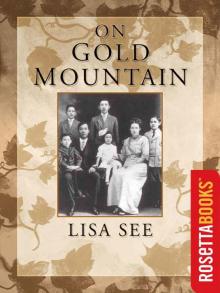 On Gold Mountain: The One-Hundred-Year Odyssey of My Chinese-American Family
On Gold Mountain: The One-Hundred-Year Odyssey of My Chinese-American Family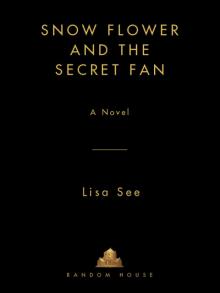 Snow Flower and the Secret Fan
Snow Flower and the Secret Fan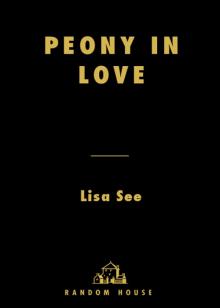 Peony in Love
Peony in Love Flower Net
Flower Net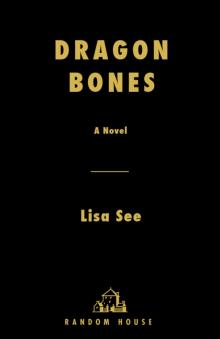 Dragon Bones
Dragon Bones Shanghai Girls
Shanghai Girls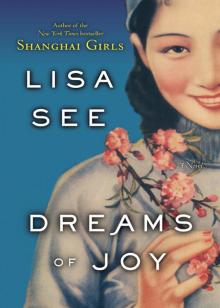 Dreams of Joy
Dreams of Joy The Island of Sea Women
The Island of Sea Women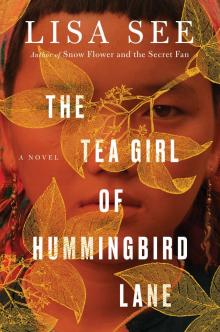 The Tea Girl of Hummingbird Lane
The Tea Girl of Hummingbird Lane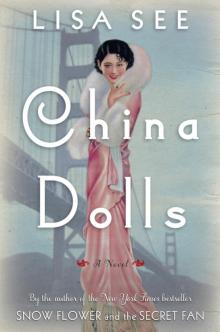 China Dolls
China Dolls The Interior
The Interior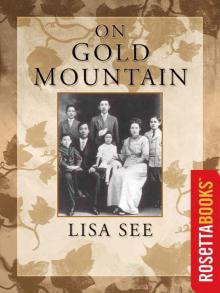 On Gold Mountain
On Gold Mountain